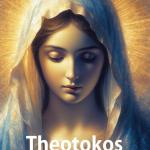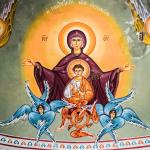Guest writer: Matt Graham
Summary Dennis’s Article
In his last reply, Dennis claims that “the veneration of the Saints is directly linked to a proper understanding of the Incarnation.” He cites John Henry Newman saying the “veneration of the Saints grew naturally out of an understanding of the deified nature of gloried man, not out of some accretion from pagan religion or philosophy.”
In support of this claim, he quotes St. Athanasius regarding the deification of man. This is followed up by a remark about Newman’s seeing a connection between deification and the veneration of saints. How is man’s deification connected to the vernation of saints? To answer this, Dennis quotes Newman again,
Those who are formally recognized as God’s adopted sons in Christ, are fit objects of worship on account of Him who is in them
So, deified humans are fit objects of worship, and this serves as the basis for the invocation of saints, the cultus of relics, and the veneration of saints. I’m assuming that when Newman says “fit objects of worship” he doesn’t mean fit objects of latria. If he did, then the debate would be over. We all agree that latria is only rightly given to God.
Finally, Dennis says that Mary is given special honor due to her role as Theotokos, and this accounts for why she is worthy of hyperdulia. Since she was declared the mother of God at the Council of Ephesus, we know the declaration is true.
Response To Dennis
Dennis remarked that my hypothesis was historically tenuous, and that is probably fair as far as it goes. However, Dennis’s case amounts to a few historical data points tied together by Newman’s claim that they are tied together. Dennis tells us what he thinks but not why he thinks it. He doesn’t explain why we should take that account of historical (doctrinal) development to be true.
If an appeal to Newman’s story counts as a sufficient historical demonstration for you, then that might be satisfying to you. But as far as I’m concerned, this is the very thing in question! Is your account of the development a better historical account of the doctrine we are discussing? I’m assuming that Dennis will unpack his reasons for this view in future posts. I look forward to engaging him when those reasons are given.
How To Proceed
In my first reply, I sketched an argument for my position. Admittedly it needs elaboration and further justification. But it wasn’t merely a few historical data points with a mere assertion that those historical claims amount to continuous development. I make the following claims:
- C1 – The Scriptures do not teach a normative doctrine of praying to saints.
- C2 – The earliest mention of a practice that (as far as I can tell) is even close to this practice is in the 2nd century and it is denounced by Irenaeus as an evil practice of the Gnostics.
- C3 – Since this practice is not normatively taught in the Scriptures or in the first two centuries of the church, it’s fair to ask – Where did it come from?
- C4 – Given Christianity’s explosive initial growth in a region bathed in Hellenistic culture, it wouldn’t be surprising if Greek thought contributed to ideas and doctrines held by Christians.
- C5 – Finally, I offered one example, namely the gnostic view of a hierarchy of beings from the material world all the way up to “The One” with a feminine mother figure at the top of the hierarchy. I stated that Marian Christian cosmology and Marian devotion are not the same as what the Gnostics believed. I only brought it up as one example of potential parallels.
The direct responses that Dennis offered were puzzling:
Dennis wrote:
since Matt fails to see Marian veneration explicitly stated in Scripture
I don’t just “fail to see it”. Even Roman Catholic apologists admit that it is difficult to find it the Protestant canon. If it is in the Scriptures, you should point out where that is and make a case for it.
He followed that up with:
Gnostics worshipped angels and “a descending divine hierarchy of aeons with Barbelo at the top of this hierarchy…,” Marian veneration appears to originate in Gnosticism.
This was one example of something that could potentially parallel and potentially contribute to a later doctrine of Marian devotion. More will come in future posts.
Finally, Dennis wrote:
I hope that St. Cardinal Newman offers a more historical and logical sources for the veneration of the Saints and Virgin Mary than Matt’s historically tenuous appeal to Gnosticism.
I don’t think it does. In order to develop a case for historical dependence, one needs to have some criteria to follow, and one should provide an argument that makes use of these criteria. You have not done either. Some general criteria might include:
- If notion A depends on notion B, then notion B should be historically prior to notion A.
- Suppose that culture A uses a set of terms to refer to a concept and culture B uses another set of terms to refer to that same concept. If culture B uses a set of terms prior to culture A, and then culture A later starts to use the same terms that culture B has already been using, then all things being equal, the new terms that culture A now uses came from culture B.
- If we can show that culture A had no interactions with culture B, then A was not influenced by culture B.
- If we can show that culture A was a predominant culture in the area where B lived, then culture A influenced culture B.
There are other criteria, but I mention these as examples of the sort of things we need to have in place to evaluate which historical hypotheses are better. Currently, we have two hypotheses:
- The Roman Catholic doctrine(s) regarding prayer to the saints is a natural outworking of our understanding of the deified nature of gloried man.
- The Roman Catholic doctrine(s) regarding prayer to the saints was added to the Christian world via Greek philosophy and mystery religions.
My task is to defend the second point. I have laid out my overall argument, but I need to talk about the actual Greek ideas that informed Christendom on this matter. I hope to address your response to this post and offer more details about where I think this Catholic doctrine came from in my next post.
Thank you!
Read The Latin Right’s other writing here.
Please visit my Facebook page and IM your questions (and follow my page) or topics for articles you would like covered.
Also, please subscribe my YouTube page for updates on upcoming articles.













